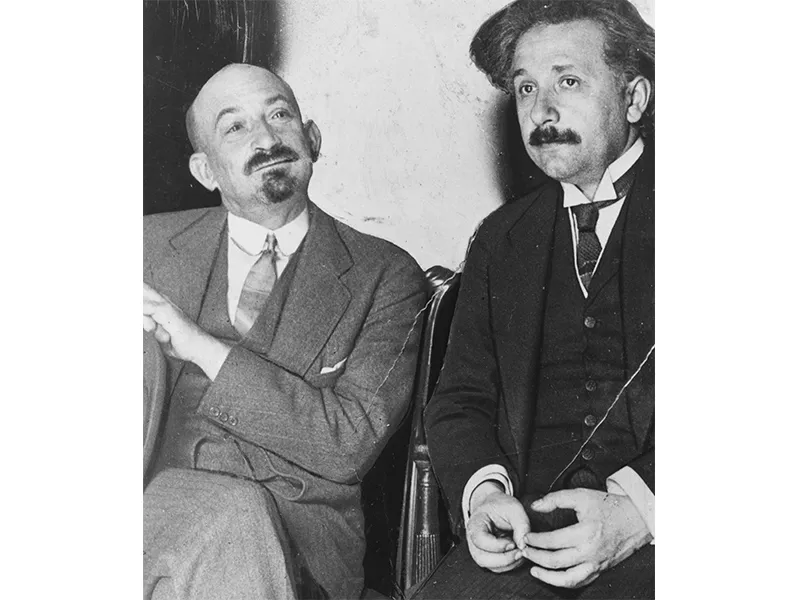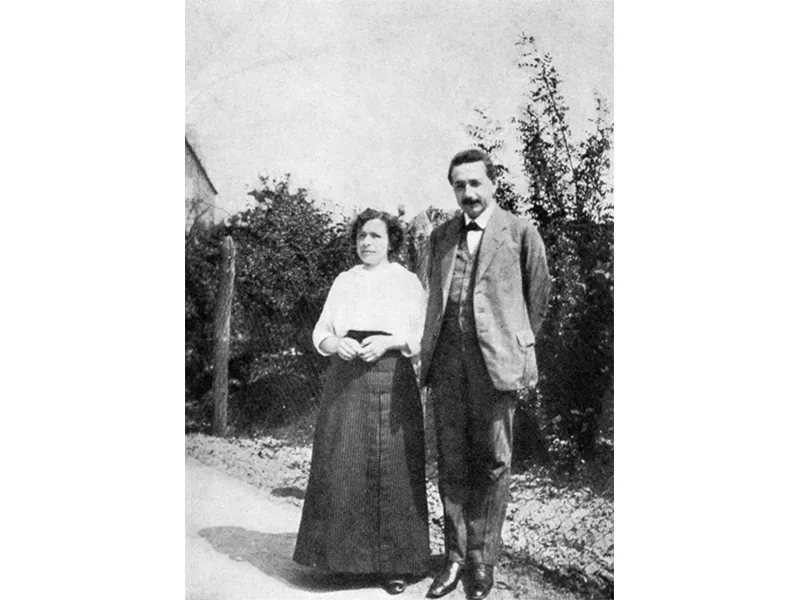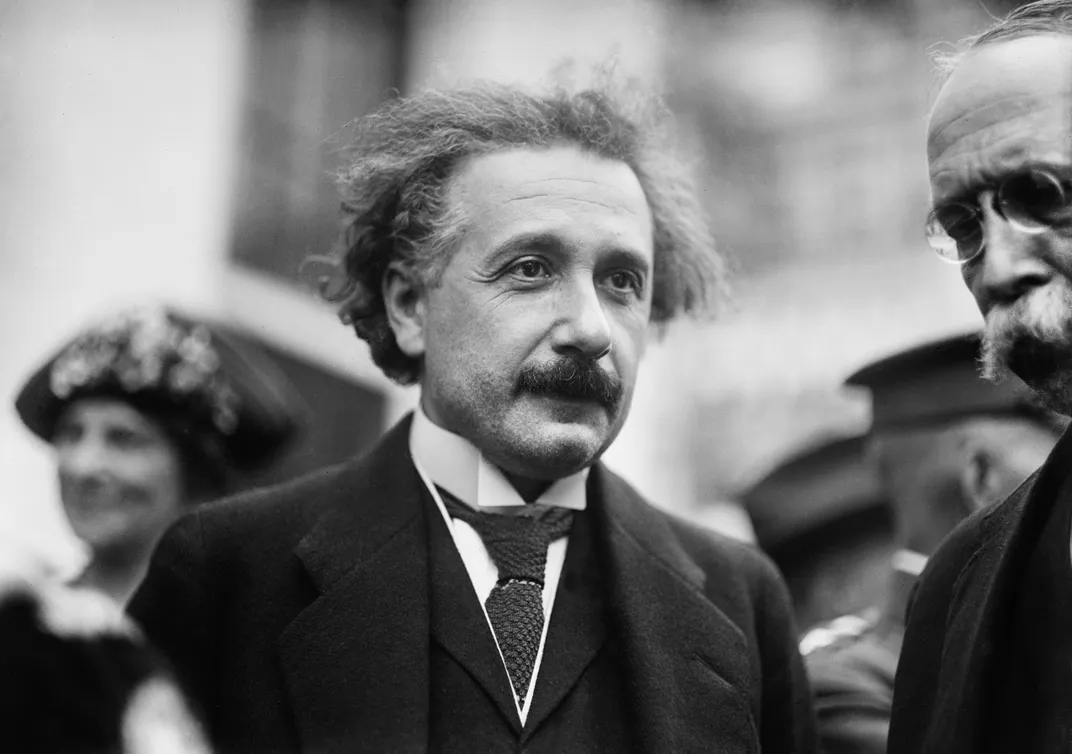One Hundred Years Ago, Einstein Was Given a Hero’s Welcome by America’s Jews
The German physicist toured the nation as a fundraiser for Zionist causes, even though he was personally torn on the topic of a Jewish nation
:focal(2818x1435:2819x1436)/https://tf-cmsv2-smithsonianmag-media.s3.amazonaws.com/filer/73/1d/731de77f-e944-4b49-adcc-329f108649a9/gettyimages-98499402.jpg)
Thousands of New Yorkers lined the harbor as the steamship Rotterdam pulled into its berth on April 2, 1921. They were cheering not for a movie star or a statesman, but for the physicist Albert Einstein, who was embarking on his first visit to the United States. Admirers swarmed his motorcade as it made its way down Fifth Avenue. The mayor welcomed him at City Hall. Crowds packed an auditorium at Columbia University as Einstein delivered a lecture on his theory of relativity. “He looked like an artist,” the New York Times reported on April 3. “But underneath his shaggy locks was a scientific mind whose deductions have staggered the ablest intellects of Europe.”
Ever since British newspapers announced that observations made during a solar eclipse in 1919 appeared to confirm Einstein’s theory of gravity, known as general relativity, Einstein had become a superstar. From that moment onward, Einstein was a celebrity-scientist—a man whose face was instantly recognizable, thanks to incessant newspaper coverage, even if his theories meant little to the average citizen. His tour of America would last two months, taking Einstein to a half-dozen cities in the northeast and as far west as Chicago.
One group was especially pleased with Einstein’s arrival on American shores: The nation’s Jews gave Einstein a particularly warm welcome in New York and during the multi-state tour that followed. At the harbor, the crowd sang both the “Star-Spangled Banner” and the Zionist anthem “Hatikva.” The arrival of Einstein, arguably the world’s most famous Jew, came as “a beacon of hope,” says Diana Kormos-Buchwald, a historian of science at Caltech and director of the Einstein Papers Project.
The tour was, first and foremost, a fundraising effort for the proposed Hebrew University to be established in Jerusalem. But given contemporary geopolitical tensions, it was also more than that. In Germany, still in shock from its defeat in World War I and facing economic collapse, the search for scapegoats (liberals, communists and, especially, Jews) was in full swing, and would intensify the following summer with the assassination of Walther Rathenau, the German foreign minister, an assimilated Jew. In Italy, the fascist leader Benito Mussolini had just come to power. Palestine, meanwhile, was under British rule, and in the Balfour Declaration of 1917, Britain promised the largely Arab-populated territory as a “national home for the Jewish people.”
All of which shone a spotlight on the issue of a Jewish homeland in the Middle East, and, more generally, on the question of how Jewish people ought to view themselves in the modern world. Were Jews a distinct people, in need of their own land? Or were they better off assimilating into the culture of whichever country they found themselves in? Against this backdrop, Einstein was forced to confront a question he had sidestepped for most of his life: What did being Jewish actually mean for him?
* * *
Einstein’s visit came at a time when American Jews were excluded from many facets of life, especially within academia. While they had entered law and medicine in large numbers by the end of the 19th century, Jewish students now found themselves confronted by a quota system at many of the nation’s elite universities. His arrival signaled “a recognition of Jewish talent” and inspired a generation of young American Jews, says Kormos-Buchwald.
Einstein’s tour was arranged by Chaim Weizmann, a former chemist himself who was now president of the World Zionist Organization. Weizmann’s plan was to squeeze in as many banquets, receptions and fundraisers as possible during the eight weeks in which Einstein would be in the U.S., raising, he hoped, millions of dollars in support of the Hebrew University. But Einstein’s views on Zionism differed from Weizmann’s. Einstein despised nationalism; he believed it was largely to blame for the global war that had just claimed some 40 million lives. He initially rejected the idea of a Jewish state on those grounds. In a speech to labor leaders some years later, he noted his resistance to the idea “of a Jewish state with borders, an army, and a measure of temporal power, no matter how modest” and balked at the “narrow nationalism” that would accompany it.

He also acknowledged the Arab peoples living in Palestine as “kinfolk,” and feared that any attempt to create a Jewish state on Arab land would lead to decades of hostility. In a letter to a colleague, the physicist Paul Ehrenfest, he cautioned that runaway Jewish nationalism “threatens to degenerate into hostility and bigotry.” Einstein hoped that internationalism, rather, might pave the way for a more just and peaceful world.
But, seeing the persecution that Jews faced in Europe and elsewhere, he began to look more favorably on the Zionist project. The deplorable treatment faced by Jews from Eastern Europe, who had arrived in Berlin in large numbers following the war, was particularly eye-opening. At one point, when Einstein decided to open some of his lectures to the public, some German students protested that, having paid their tuition, they were now being crowded out by freeloaders; some reportedly shouted anti-Semitic taunts.
A number of German scientists, meanwhile, launched unfounded attacks on Einstein’s work, dismissing relativity as “Jewish science.” In early 1920 he wrote to a friend, “In Germany today hatred of the Jews has taken on horrible expressions.”
These circumstances made Einstein an enthusiastic backer of the proposed institution where Jewish students could pursue their studies in peace. One month ahead of the U.S. visit, he wrote to his friend Fritz Haber, the German chemist, that the thought of such an institution filled him “with particular joy.”
“Einstein was what we often call a cultural Zionist,” says Kormos-Buchwald. “He believed strongly that there should be a place where Jews could study, without being discriminated against, because of their ethnicity or race or religion.”
Despite their differences, Weizmann saw value in having the newly popular Einstein by his side, and in introducing the scientist to American Jewry. On that first day in Manhattan, instead of proceeding directly to the Hotel Commodore in Midtown, the motorcade took a leisurely tour of the Jewish neighborhoods of the Lower East Side. (It is not known who requested the detour, but it seems likely that Weizmann, or one of his American colleagues, had the idea.) Car horns honked as the motorcade passed; as Weizmann later recalled, they finally reached the hotel at 11:30 p.m., “tired, hungry, thirsty and completely dazed.”
While Einstein often professed to be baffled by his fame, he was willing to use it for causes that he believed in. Toward the end of the tour, he wrote to his friend Michele Besso: “I had to let myself be shown around like a prize ox, speak countless times in large and small assemblies, deliver countless scientific lectures. It's a miracle that I endured it.” Nonetheless, with the trip behind him, he felt he had “done something truly good.”
The 1921 visit was more than just a fundraising project. “The Hebrew University was the reason he joined that trip at that time, but there were other motivations,” says Kormos-Buchwald. “It was a very good excuse for him to leave Europe at that moment.” Einstein was a professor in Berlin, and though the rise of Nazism was still more than a decade away, German Jews were already facing a backlash from far-right movements, some of whose members blamed the nation’s Jews for Germany’s loss in the First World War.
Einstein’s fame and status protected him far more than the average German Jew; nonetheless, he was despised, in some circles, for his opposition to the war, his liberal leanings, and his commitment to pacifism. “Einstein was put on a list of traitors; there were calls for him to be assassinated, because of his pacifist views,” says Kormos-Buchwald.
Einstein had another, more personal reason to look forward to spending time on American soil. He was recently divorced; his ex-wife, Mileva Marić, was living in Zurich with their two sons. (Einstein, meanwhile, had married his cousin, Elsa Einstein Löwenthal.) With the German economy in free-fall, Einstein was in search of financial security for his family. He figured that in America, in between his commitments to Weizmann, he could deliver lectures on his own—and set his own price, explains Steven Gimbel, a philosopher at Gettysburg College and the author of several books about Einstein. “He could get paid in hard currency, and have it sent directly to Switzerland without being devalued through Germany, and thereby could support his family,” says Gimbel.

As it turns out, however, Einstein was not particularly astute when it came to matters of finance. Not knowing how much to charge for an appearance, he asked the University of Wisconsin for $15,000—“which at that time was just an absurd amount,” says Gimbel. The university said no, and when other schools also started to say no, he revised his figures downward. Some universities agreed, but Wisconsin “simply had nothing else to do with him.”
It’s not clear how much audiences actually absorbed when they heard one of Einstein’s lectures. He spoke in German; but even if his talks had been in English, it seems likely the subject matter – relativity, and the nature of space and time – would have left many rather befuddled. At Princeton, he’s said to have set down more than 100 equations on the blackboard over the course of a five-day lecture series (each lecture apparently followed by a 20-minute summary in English). As one student put it, “I sat in the balcony, but he talked right over my head anyway.” In Washington, which he visited in late April, Einstein met briefly with President Warren G. Harding. Inevitably, reporters asked Harding if he understood Einstein’s theory; he replied happily that he did not. Later, for reasons that are far from clear, the U.S. Senate decided to debate the theory of relativity, while in the House of Representatives, J.J. Kindred of New York proposed that a synopsis of Einstein’s theory be placed in the Congressional Record, on the grounds that it “may bear upon the legislation of the future as to general relations with the cosmos.”

Everywhere that Einstein went, the crowds followed. In Hartford, Connecticut, some 1,500 spectators lined the route; as a local newspaper reported, the crowds “cheered wildly as Dr. Weizmann and Prof. Einstein stood up in the car to receive flowers.” And that was nothing compared to the scene in Cleveland. As Walter Isaacson described it in his 2007 book, Einstein: His Life and Universe, the crowd that descended on Einstein “included two hundred honking and flag-draped cars. Einstein and Weizmann rode in an open car, preceded by a National Guard marching band and cadre of Jewish war veterans in uniform. Admirers along the way grabbed on to Einstein’s car and jumped on the running board, while police tried to pull them away.” Einstein, a naturally private person, grudgingly accepted the spectacle of it all. “As an introvert, he didn’t like big public affairs; he would complain about the dinners and the banquets,” says Ze’ev Rosenkranz, a senior editor of the Einstein Papers Project. “But if it was a cause that he believed in, he understood that that was a price he had to pay.”
The Jews that Einstein encountered in America were different from those he knew back in Europe, says Gimbel. In Europe, many Jews, wary of being seen as outsiders, strove to assimilate; Haber, the chemist, was an example of a Jew who “yearned to be an authentic German,” Gimbel says. “Whereas in America, for the first time, Einstein saw Jews who could be patriotic... who were proud Americans and who were proud Jews.” While American Jews faced many kinds of discrimination, the were not seen as “other” to the extent that they were in Europe, Gimbel says. There, “Jews were seen in a certain sense as a different race.” In America, the difference between Jews and gentiles “wasn’t racialized in the same way.”
* * *
In the end, the U.S. visit was not as successful as Weizmann had imagined, raising only $750,000 and not the $4 million that had been hoped for. Nonetheless, the project that Einstein was most attached to—the Hebrew University—came to fruition, opening its doors in April 1925. Einstein left Germany in December 1932, never to return; Hitler came to power one month later. Einstein settled in the U.S. permanently in October 1933.
While Einstein never matched Weizmann’s zeal for a Jewish state, the U.S. visit opened his eyes to the plight of his fellow Jews as a matter of global concern, and he came to embrace his Jewish identity ever more deeply. In a 1934 essay, Einstein described which aspects of that identity meant the most to him: “The pursuit of knowledge for its own sake, an almost fanatical love of justice and the desire for personal independence—these are the features of the Jewish tradition which make me thank my stars that I belong to it.”
The state of Israel was created in 1948, with Weizmann serving as its first president. (The largely ceremonial role had been offered to Einstein, who turned it down.) Einstein, who spent his final years in Princeton, would live another seven years. As he put it near the end of his life: “My relationship to the Jewish people has become my strongest human bond.”
Editor's note, April 8, 2020: This story has been updated to reflect that Chaim Weizmann was Israel's first, and not second, president.